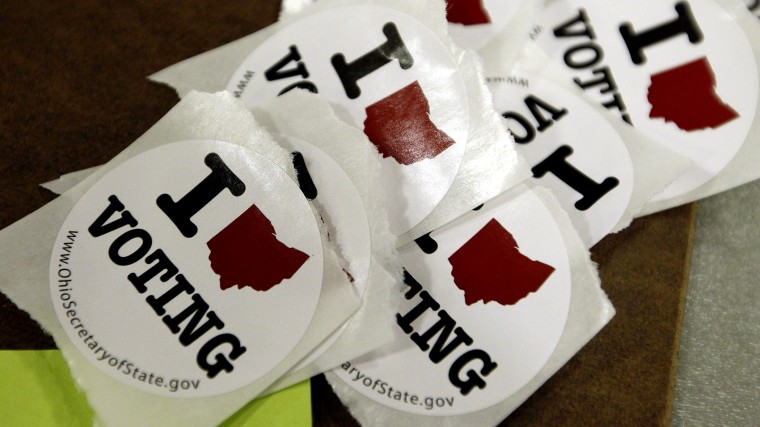For voting-rights advocates in Ohio, everything looked like it was going well. A few weeks ago, a federal district court
reversed Republican-imposed voting restrictions in the Buckeye State, restoring early-voting opportunities. Last week, the 6th Circuit Court of Appeals
agreed in a unanimous order, clearing the way for Ohio voters to cast early ballots if they choose.
Voting was all set to begin in Ohio -- literally tomorrow morning -- right up until the Supreme Court intervened this afternoon. Lyle Denniston
reported:
With just sixteen hours before polling stations open in Ohio, the Supreme Court on Monday afternoon blocked voters from beginning tomorrow to cast their ballots in this year’s general election. By a vote of five to four, the Justices put on hold a federal judge’s order providing new opportunities for voting before election day, beyond what state leaders wanted. The order will remain in effect until the Court acts on an appeal by state officials. If that is denied, then the order lapses. It is unclear when that scenario will unfold.
Remember, Republican officials in Ohio have been trying to cut early voting, while also making it harder for voters to cast ballots on weekends and during evening hours. These changes prompted a lawsuit from civil-rights proponents, arguing that the GOP-imposed restrictions, approved for no good reason,
disproportionately affected low-income and African-American voters -- who, you guessed it, might be more inclined to vote Democratic.
The Supreme Court's announcement wasn't on the merits of the case, and there haven't been oral arguments. Rather, this was in response to an emergency appeal from Ohio Secretary of State Jon Husted (R), who's invested considerable energy in recent years in approving new restrictions on voting.
The Supreme Court was divided 5-to-4, with -- wait for it -- Roberts, Alito, Kennedy, Scalia, and Thomas siding with Ohio Republicans trying to limit access. These are the same five justices appointed by Republican presidents.
So what happens now?
The court fight challenging the legality of Ohio's efforts to curtail voting will continue, but in the meantime, those who hoped to cast ballots tomorrow will have to wait
until Oct. 7.
Rick Hasen, an elections-law expert who's been skeptical of this case on the merits,
explained this afternoon:
Although the order is “temporary” in the sense that it will be in place pending a ruling on a cert. petition ultimately to be filed by Ohio in the Supreme Court, that won’t happen before this election, and so for this election the new shorter voting period is in effect—and not the old rules put back in place by the district court and affirmed by the 6th Circuit. [...] I am worried this case will make bad law, and have bad effects in cases such as challenges to Wisconsin’s voter id law, Texas’s voter id law, and North Carolina’s omnibus bill making it harder to vote. I have argued that when there is a significant burden on voters imposed for no good reason, or imposed for a partisan reason, then courts should shut down voting restrictions. The Ohio case did not involve significant burdens, and the theories accepted by the district court and 6th Circuit panel were vast constitutional expansions of voting rights. As Ned Foley reminded us, not everything that is good policy is constitutionally required. But now if the Supreme Court reads both the Equal Protection Clause and Section 2 of the Voting Rights Act very narrowly in the Ohio case, it is bad news all around and in cases where the changes matter more. As I concluded in the Slate piece, we ignore these cases at our peril.
MSNBC's Zach Roth, who covers these issues as well as anyone in the business, has more
here.
